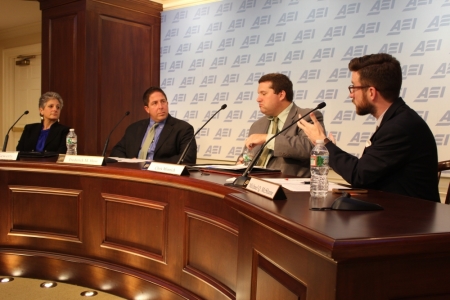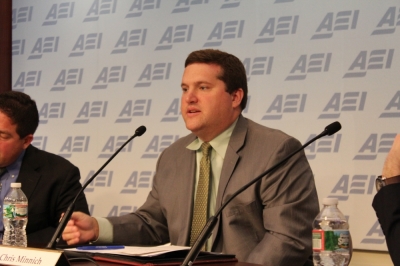Common Core Supporter: Federal Gov't Should Have Never Been Involved

WASHINGTON – An advocate of the Common Core, who had influence in the development and state adoptions of the set of state standards in 2009, said that most supporters of Common Core today would agree that the standards would be better off if the federal government had never gotten involved in incentivizing states to adopt them.
Although The Common Core began as an initiative by the The National Governors Association and the Council of Chief State School Officers (CCSSO), opponents argue the federal government is forcing its influence on state school curriculum by holding ransom a share of the $4.3 billion in "Race to the Top" education funding, which led to 45 states initially implementing all the standards. (Three states, Indiana, Oklahoma and South Carolina, have since pulled out, and Minnesota adopted the English, but not the math, standards.)

Chris Minnich, current executive director of CCSSO and the council's strategic initiatives director of standards assessment and accountability in 2009, told attendees of an American Enterprise Institute panel on Wednesday that most supporters of Common Core believe that the Common Core should be a state-led effort and should not have been federally incentivized.
"I think it is pretty clear that most of us [supporters], but I can't say all of us, believe that declaring our independence and making sure that it is and remains to be state-led is something that is critical," Minnich said. "Figuring out how as state chiefs and as governors we step into this space."
Minnich added that he believes that the federal government's involvement has made states hesitant to implement Common Core testing.
"First of all, the federal involvement in this has just not been helpful in every scenario that we have been following," Minnich said. "You see any sort of pushback on testing has usually been routed in the fact that the federal government is involved in funding the consortia and also put incentives for folks to adopt Common Core standards."
Frederick Hess, director of education policy studies at American Enterprise Institute and neither supporter nor advocate of the Common Core, agreed that the federal government should have not gotten involved.
Hess also said that he thinks that a handful of states still would have adopted the standards without the Obama administration's incentives and would have provided a good opportunity for experimenting with its implementation and testing with a smaller sample size than 45 states.
"Personally, I think to Chris' point, if the federal government had never weighed into this back in 2009, I think 15 states, a dozen states, maybe 20, but about 15 states would have gone ahead and done the Common Core on there own," Hess said.
Hess alluded to experiments with consortia testing that were happening among three states in New England before the Common Core. Hess said states had previously showed a willingness to work together without the federal government to implement higher standards.
"I think they would have figured out a way to do a common assessment like had already been done in New England for several years at that point among three states," Hess said. "I think what we would have seen is a truly and genuinely kind of state-led effort, which if it was working and being implemented well, others would have wanted in."
While much uproar has been seen from Common Core opponents on the wisdom of the federal government incentivization of education standards, not much has been said from the pro-Common Core side. But Minnich believes "most" Common Core supporters disagree with the federal government's involvement.
Minnich added that he thinks this is due to the lack of fundraising by Common Core supporters along with the "passion" of Common Core opponents that has painted a negative picture of the standards for the American public.
"There is fundraising on the anti-side and there is no fundraising on the pro-side," Minnich said. "Granted there are resources on the pro-side, but the anti folks have passion and money and it is going to be a hard road to change the branding of Common Core if we were going to go down that path."
Minnich said despite all the negative attention, the standards are seemingly still supported by America's teachers.
"I think the bigger thing is figuring out how do we land this so that we have educators that believe in these standards," Minnich said. "Granted there wasn't as much attention on the Common Core in 2010 as there is in 2014. Despite all the negative attention that it has received, teachers poll in the positives on Common Core. So, there is something about the standards that are really worth holding onto."
You can watch the full panel presentation below:





















